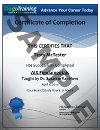Course Description
This Oracle 11g Fusion Middleware Administration course covers the management and configuration of the basic components of Oracle Fusion Middleware. Oracle Fusion Middleware is the leading business innovation platform for the enterprise and the cloud. It enables enterprises to create and run agile, intelligent business applications while maximizing IT efficiency through full utilization of modern hardware and software architectures. In this course, we will discuss the security, applications, ports, servers and agents. You will also learn about deploying and monitoring Oracle Fusion Middleware (OFM) and diagnosing problems in OFM and managing diagnostic data including log files.
Oracle Fusion Middleware is the only middleware available from any vendor that provides a complete, open, and integrated approach across social, mobile, and cloud technologies. It offers the efficiency of working with a single, strategic partner for all of your middleware requirements, as well as the cost effectiveness of certified integrations with Oracle Database, Oracle Applications, and Oracle Engineered Systems. With best-in-class offerings across every product line, Oracle Fusion Middleware can enable you to maximize the processes and applications that drive your business today and provide a foundation for innovation in the future.
In This Course You Will Learn:
- Manage Oracle Fusion Middleware
- Change ports
- Deploy applications
- Backup and recover Oracle Fusion Middleware
- Configure security
- Automate behavior of the components
- Manage OFM security information in KeyStores, certificates and wallets
- Deploy applications to OFM
- Monitor the health of OFM applications
- Manage and search OFM log files
- Diagnose problems in OFM
- Prepare OFM trouble tickets for upload to Oracle support
Prerequisites
Familiarity with Java or:
and:
Outline
Module 00: Oracle Fusion Middleware Administration - Course Introduction
Module 01: Introduction and Overview of Oracle Fusion Middleware (OFM)
- OFM Components
- Model View Controller (MVC) Design
- Oracle Application Development Framework (ADF)
Module 02: ADF Functionality
- ADF Faces
- ADF Views
- ADF Controller
Module 03: Starting a Project in JDeveloper
- ADF Business Components
- JDeveloper Wizards
- Building the Business Model
- Exercise: Installing JDeveloper
Module 04: Starting and Stopping Oracle Fusion Middleware Components
- Oracle WebLogic Server Instances
- Administration Servers
- Managed Servers
Module 05: Starting and Stopping Oracle Fusion Oracle Fusion Middleware Agents
- Components
- Oracle Managed Agents
- Applications and Environments
- Special Topics
Module 06: Managing the OFM Listening Ports
- Viewing Port Numbers
- Changing Port Numbers
- Viewing Port Usage Pages
Module 07: Managing the Oracle Web Cache
- Using the Fusion Middleware Control
- Changing Oracle Process Manager and Notification Server (OPMN) Ports
- Changing Oracle Portal Ports
Module 08: Managing Oracle Metadata Ports
- Changing the Repository Listener Port
- Changing the Oracle Internet Directory Port
- Changing the System Data Source
- Updating Oracle Single Sign-on
- Exercise: Starting and Stopping OFM Components and Port Connections
Module 09: Benefits of Security
- Why use security in OFM?
- Security Components and Tools
- Security Management using Keystores
Module 10: Establishing Security
- Configuring Security Tools
- Configuring Security in the Web Cache
- Configuring Security for the Middle Tier
Module 11: Enabling Security in OSM Applications
- SSL in the Data Tier
- SSL in the Database
- SSL in Oracle Forms
- SSL in Oracle Portal
- SSL Best Practices for Administrators
- Exercise: Configuring Secure Socket Layer (SSL)
Module 12: Configuring the SSL Automation Tool
- Benefits of the Tool
- Variables of the Tool
- Components Effected by the Tool
Module 13: Using the Certificate Authority
- Generating the CA Certificate
- Configuring a Component Server
- Configuring a Client
- Exercise: Using the SSL Automation Tool
Module 14: Managing KeyStores
- Overview of KeyStore Management
- Oracle Wallet as a KeyStore
- KeyStore Management Tools
Module 15: Using Java KeyStores
- JKS Management
- JKS Lifecycle
- Common JKS Operations
Module 16: Managing Certificates
- Common Certificate Operations
- Generating a Certificate
- Importing a Certificate
- Certificates and KeyStores
- Exercise: Managing KeyStores, Wallets and Certificates
Module 17: The Process of Deployment
- Deployable Applications
- Data Source Management
- Configuring the Data Storage
- Java Naming and Directory Interface (JNDI)
Module 18: Deploying and Un-deploying Applications
- Planning the Deployment Process
- Automating the Deployment Process
- Configuring the Deployment Process
Module 19: Automating Application Deployment
- Managing Deployment Plans,
- Common Deployment Tasks
- Managing Metadata Storage Attributes
- Exercise: Understanding the Deployment Process
Module 20: Monitoring System Components in OFM
- What are system components?
- Monitoring Administration Servers
- Monitoring Clusters
- Monitoring Domains
Module 21: Monitoring Non-System Applications in OFM
- What are the non-system applications?
- Monitoring Application Developer Framework (ADF) Applications
- Monitoring Service Oriented Architecture (SOA) Composite Applications
- Monitoring the Performance of OFM
- Viewing the Topology of OFM
- Exercise: Monitoring Oracle Fusion Middleware
Module 22: Searching Log Files
- Content of Log Files
- Viewing Log Files
- Filtering Log Files
Module 23: Working with Log Files
- Downloading Log Files
- Log File Locations
- Configuring Log Files
Module 24: Configuring Log Files
- Configuring Log File Rotation
- Setting Log File Levels
- Exercise: Managing Log Files and Diagnostic Data
Module 25: Understanding the Diagnostic Framework
- Terminology
- Elements
- Commands
- How it Works
Module 26: Using the Diagnostic Framework
- Configuration
- Best Practices
- Viewing Diagnostic Dumps
- Executing Diagnostic Dumps
- Reporting to Oracle Support
- Exercise: Oracle Fusion Middleware Administration –Diagnosing Problems


